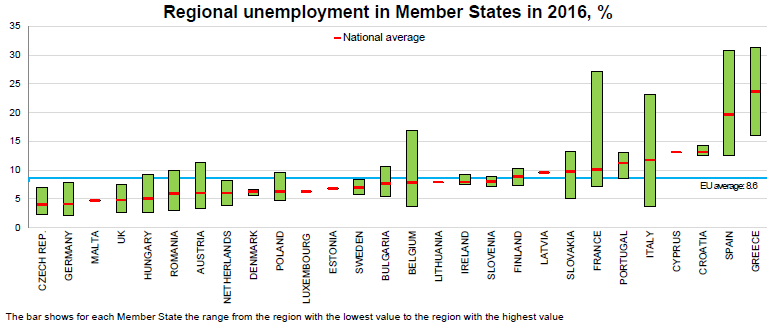Eurostat/Unemployment rates in the EU regions ranged from 2.1% to 31.3%/27 Απριλίου 2017 More than 80% of the NUTS 2 regions of the European Union (EU) saw their unemployment rate fall in 2016 compared with 2015, and around 60% recorded a decrease of at least 0.5 percentage points. However, regional unemployment rates continued to vary widely across the EU regions, with the lowest rates recorded in Niederbayern (2.1%) in Germany …Read More
Drivers of the post-crisis slump in the Eurozone and the US
Kollmann, Robert, Pataracchia, Beatrice, Raciborski, Rafal, Ratto, Marco, Roeger, Werner, Vogel, Lukas, (2017), “Drivers of the post-crisis slump in the Eurozone and the US “, VoxEU, 27 Απριλίου The Global Crisis led to a sharp contraction and long-lasting slump in both Eurozone and US real activity, but the post-crisis adjustment in the Eurozone and the US shows striking differences. This column argues that financial shocks were key determinants of the …Read More
Internal devaluation in currency unions: the role of trade costs and taxes
Petroulakis, Filippos, (2017), “Internal devaluation in currency unions: the role of trade costs and taxes”, European Central Bank Working Paper Series No 2049, Απριλίος This paper studies export adjustment to negative shocks in currency unions. I consider the hitherto ignored role of trade costs and taxes in internal devaluations, which have been brought to the fore of international policy during the recent euro periphery crisis. Trade costs can limit the …Read More
Household real income per capita down in the euro area but up in the EU28-Fourth quarter of 2016
Eurostat/Household real income per capita down in the euro area but up in the EU28-Fourth quarter of 2016/28 Απριλίου 2017 In the euro area, in real terms, household income per capita decreased by 0.2% in the fourth quarter of 2016, after an increase of 0.2% in the previous quarter. Household real consumption per capita increased by 0.1% in the fourth quarter of 2016, after an increase of 0.4% in the …Read More
Draghi’s Right to Keep His Foot on the Gas
Giugliano, Ferdinando, (2017), “Draghi’s Right to Keep His Foot on the Gas”, Bloomberg View, 28 Απριλίου Since becoming president of the European Central Bank, Mario Draghi has rarely looked as relaxed as he did in Thursday’s press conference. It’s not hard to see why: The euro-zone economy is gathering speed, confidence is soaring, and unemployment is tumbling. The recovery is also spreading across the region, reducing the risk that some …Read More
Surveying Corporate Investment Activities, Needs and Financing in the EU
European Investment Bank Investment Survey 2016/2017 (EIBIS), (2017), “Surveying Corporate Investment Activities, Needs and Financing in the EU”, European Investment Bank (EIB), 10 Απριλίου 2017 Business investment is recovering across Europe. SMEs and firms active in the construction sector and service sector expect an expansion from relatively low levels of investment activities; whereas large firms, manufacturing firms and firms active in the infrastructure sector expect an expansion from already relatively …Read More
Euro area annual inflation up to 1.9%
Eurostat/Euro area annual inflation up to 1.9% /28 Απριλίου 2017 Euro area annual inflation is expected to be 1.9% in April 2017, up from 1.5% in March 2017, according to a flash estimate from Eurostat, the statistical office of the European Union. Looking at the main components of euro area inflation, energy is expected to have the highest annual rate in April (7.5%, compared with 7.4% in March), followed by …Read More
For A Treaty Democratizing Euro Area Governance
Hennette, Stéphanie, Sacriste, Thomas Piketty Guillaume, Vauchez, Antoine, (2017), “For A Treaty Democratizing Euro Area Governance”, Social Europe, 27 Απριλίου Over the last ten years of economic and financial crisis, a new centre of European power has taken shape: the ‘government’ of the Euro Area. The expression may seem badly chosen as it remains hard to identify the democratically accountable ‘institution’ which today implements European economic policies. We are indeed aiming …Read More
Why Europe Still Needs Cash
Mersch, Yves, (2017), “Why Europe Still Needs Cash”, Project Syndicate, 26 Απριλίου Non-cash payment options have been proliferating in recent years. Credit cards, online transfers, and direct-debit payments are already well established. Now, smartphone-enabled digital-payment solutions and mobile wallets are also gaining ground. The emergence of potentially disruptive innovations like distributed ledger technologies indicate that further and possibly fundamental change may be on the horizon. Independent of these new and incipient …Read More
The global decline in the labour income share: is capital the answer to Germany’s current account surplus?
Berger, Ennet, Wolff, Guntram B., (2017), “The global decline in the labour income share: is capital the answer to Germany’s current account surplus?”, Bruegel, 26 April There are two broad views of adjustment in Europe’s economic and monetary union. The first is that the divergence of competitiveness in the euro area is the fault of the peripheral countries, which were guilty of “losing their competitiveness simply by becoming too expensive” prior …Read More








